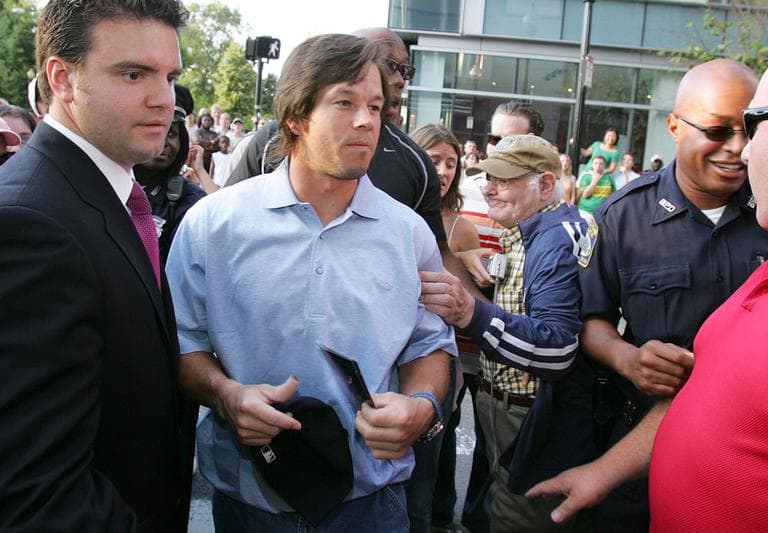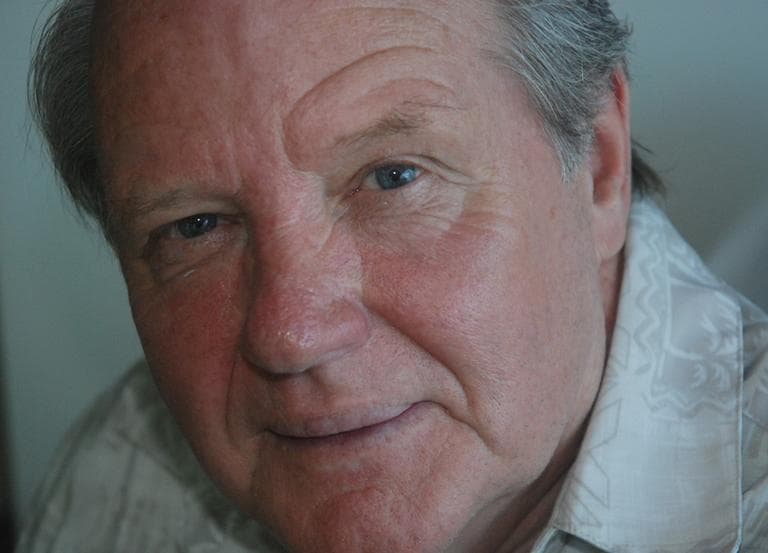Advertisement
So You Wanna Be In Pictures? Being Cast As A Movie Extra
Resume
Pick a film — pretty much any big film — freeze a scene, then look past the main actors. Notice the woman behind the counter. The people at the bar. The fans cheering loudly in the stands, like in the Oscar-winning film, “The Fighter."
They’re all extras, or background actors (BAs for short). Some prefer to be called atmospheric artists. And they’re in demand these days with four movies currently being filmed in the Boston area, including "Ted" with Mark Wahlberg, and the latest Adam Sandler vehicle, "I Hate You Dad."
More productions are slated for August and into the fall, according to Angela Peri, casting director and owner of Boston Casting in Allston. When we spoke she said there are plenty of opportunities for locals to get in on the action. Case in point: Peri will need "thousands of extras" to populate the upcoming lacrosse film, "Crooked Arrows."
“If you do get on set, don’t try to talk to Mark Wahlberg.”
Angela Peri, owner of Boston Casting
"I see them as set-dressing," she explained, "and if you didn't have them the scenes wouldn't look real."
“Crooked Arrows” is supposed to start filming in August. Peri and her staff are having a busy summer already, especially compared to last year. They're handling extras casting for three of the four movies in production right now. Last week, Boston Casting scrambled to find “female model types," ages 20-30 years old, for Wahlberg's “Ted.”
During my visit Peri sat at her desk, with posters for "The Proposal" and "Mall Cop" looming behind her, and admitted to being "freaked out" because she still didn't have any "pretty girls."
The Difficulty Of Finding Extras
This is the story of Peri's life. She and her extras casting director Ashley Skomurski constantly surf through a database of 60,000 potential extras — but somehow there never seem to be enough. They need fresh faces, Peri said, and she encourages everyone — even me — to apply online and upload my headshot to the Boston Casting website.
"You will get called to do a day of extra work," she assured me before adding some helpful advice. "Go with a good attitude. Pack a snack, bring a bottle of water, bring the newspaper, and who’s better than you, having lunch with Mark Wahlberg?" Then Peri repeated, with a smile, "Who is better than you?"

Peri has filled the arena in Lowell for “The Fighter” and the stands at Fenway Park for “Fever Pitch.” She’s seen every kind of extra. Some do it for fun. Others see it as a springboard into acting careers. And while having lunch on set with Mark Wahlberg might sound glamorous, being an extra is actually extremely demanding work. And the regulations that come with being a BA can get pretty complicated.
Of the hundreds of extras Peri casts for most big Hollywood films, the first 85 must be union members of the Screen Actors Guild, or SAG. After that quota is met Peri can hire as many non-union extras as the production needs.
Union actors cost more, but you get what you pay for, according to Douglass Bowen Flynn, president of SAG's Boston branch. To make his point the actor quoted a saying from the theater: "The king is only king if the servants bow."
Extras with a level of experience and professionalism are crucial, Bowen Flynn said, "if the background actors aren't doing their job, then the fictional world that is created falls apart. Everybody has to 'play pretend' well."
There are pluses for actors who join the union, too, he said, adding, "the biggest benefit is the pay."
What about non-union extras? "You get a bag lunch and to say you were on a movie set," Bowen Flynn answered.
Union Vs. Non-Union Extras
But that's enough compensation for scores of amateurs who've been bitten by the acting bug. Many do extra work for nothing. Non-union extras earn anywhere between zero and $100 a day. Compare that to union actors, who have the opportunity to earn health care and all sorts of bumps in pay, including "wet pay" if you get wet on set, and "smoking pay" if you have to smoke in a scene. There's even "haircut pay." The base rate is $139 for eight hours, but Bowen Flynn said nobody in this business works just eight hours.
"Usually you’re looking at a 12-hour day, so for the ninth and 10th hours you get paid time-and-a-half. Then for the 11th, 12th, 13th, 14th and 15th you get paid double time. After 16 hours you get what’s called ‘golden time,’ which is you’re daily rate every hour."
SAG background actor Peter McSwiggin almost hit that jackpot two weeks ago on the set of Sandler’s “I Hate You Dad.” Sitting in his Middleton living room he recalled how a bunch of extras were bussed over to the Cabaret in Peabody for a scene set in a strip club. For the movie it'll be called, "Bacon and Legs," McSwiggin said with a laugh, adding, "I closed one eye in some of the scenes I was in."

The shoot wrapped at 6:30 a.m., he recalled, just 15 minutes shy of that 16-hour mark.
"In the seven years I’ve been doing this I got golden time maybe half a dozen times," McSwiggin told me, "and it’s sweet when you get the paycheck."
But McSwiggin, a 70-something retiree, isn’t in it for the paycheck. If he, or any extra was, he said, "You’d starve to death."
Even so, this aspiring actor has worked background on a bunch of films, including "Company Men," "Grown Ups," "The Fighter" and "Bride Wars." But it’s not like McSwiggin has gotten much “screen time” in the final cuts. He was one of a few Harvard scholars in Denzel Washington's "The Great Debaters." And you can search for him in the Kevin Spacey movie “21,” about the MIT blackjack club. He played a professor during a cocktail party scene.
"You only get a glimpse of me by the doorway," McSwiggin said with a laugh, "It’s like Waldo — where’s Waldo?"
Screen time is a small perk for a lot of long days and nights, McSwiggin said. To survive as an extra you have to be patient. And you must have endurance. Hours can pass you by as you sit in "extras holding," as it's called, waiting for your turn to cross the street or hold a fork in a restaurant scene.
Plus, it really is serious work, according to Peri, and big business. Background actors need to be professional and play by the rules.
"There's nothing worse than a crowd scene and you get that one stupid guy who’s looking right in the camera," Peri told me. "Sometimes that could cost hundreds of thousands of dollars to shoot that scene, and then they can’t use it because of that one stupid extra. And we take the flack for that."
And Peri said, "If you do get on set, don’t try to talk to Mark Wahlberg."
But all the rules and challenges that come with being an extra don’t deter McSwiggin from applying for more background work. He has the bug, he said. Now he's waiting for a call for “Ted” and is feeling hopeful for a shot at the upcoming horror film “Rest In Peace Department.” It’s supposed to start shooting later this summer, McSwiggin informed me, and he said word on the street is the producers will need 2,000 zombies, maybe more. Bloody, decaying zombies.
"So that means makeup and the whole bit," McSwiggin mused with a wistful glimmer in his eye.
Now that’s a lot of bodies!
More:
This program aired on July 11, 2011.
